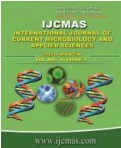


 National Academy of Agricultural Sciences (NAAS)
National Academy of Agricultural Sciences (NAAS)

|
PRINT ISSN : 2319-7692
Online ISSN : 2319-7706 Issues : 12 per year Publisher : Excellent Publishers Email : editorijcmas@gmail.com / submit@ijcmas.com Editor-in-chief: Dr.M.Prakash Index Copernicus ICV 2018: 95.39 NAAS RATING 2020: 5.38 |
A study was conducted in District Allahabad, Uttar Pradesh State of India to assess the knowledge of beneficiaries and non-beneficiaries towards different scientific interventions and their potential prospects being offered under World Bank supported flagship programme viz Diversified Agriculture Support Project (DASP). For this purpose, a series of relevant questions / statements with respect of Agriculture (Crop Husbandry), Horticulture, Animal Husbandry, Fisheries and Sericulture were administered on beneficiaries and non-beneficiaries. The major findings of the study revealed that majority of beneficiaries (50.66 per cent) had high level of knowledge and percentage of beneficiaries with medium of knowledge was estimated at 40.00 while 9.33 per cent of the beneficiaries had low level of knowledge. In comparison, majority of Non-beneficiaries (88.66 per cent) had low level of knowledge followed by 9.33 per cent with medium level of knowledge and only 2.00 per cent of non-beneficiaries had high level of knowledge. The data reflected that beneficiaries had comparatively high level of knowledge than non-beneficiaries regarding agriculture technologies being provided to them through DASP. The knowledge gained through scientific interventions, trainings, demonstrations and other important extension activities was highly instrumental for increasing the farm yields and net returns of beneficiaries under DASP than Non-beneficiaries who were seen lagging behind on almost all attributes & parameters designed for the purpose.
 |
 |
 |
 |
 |